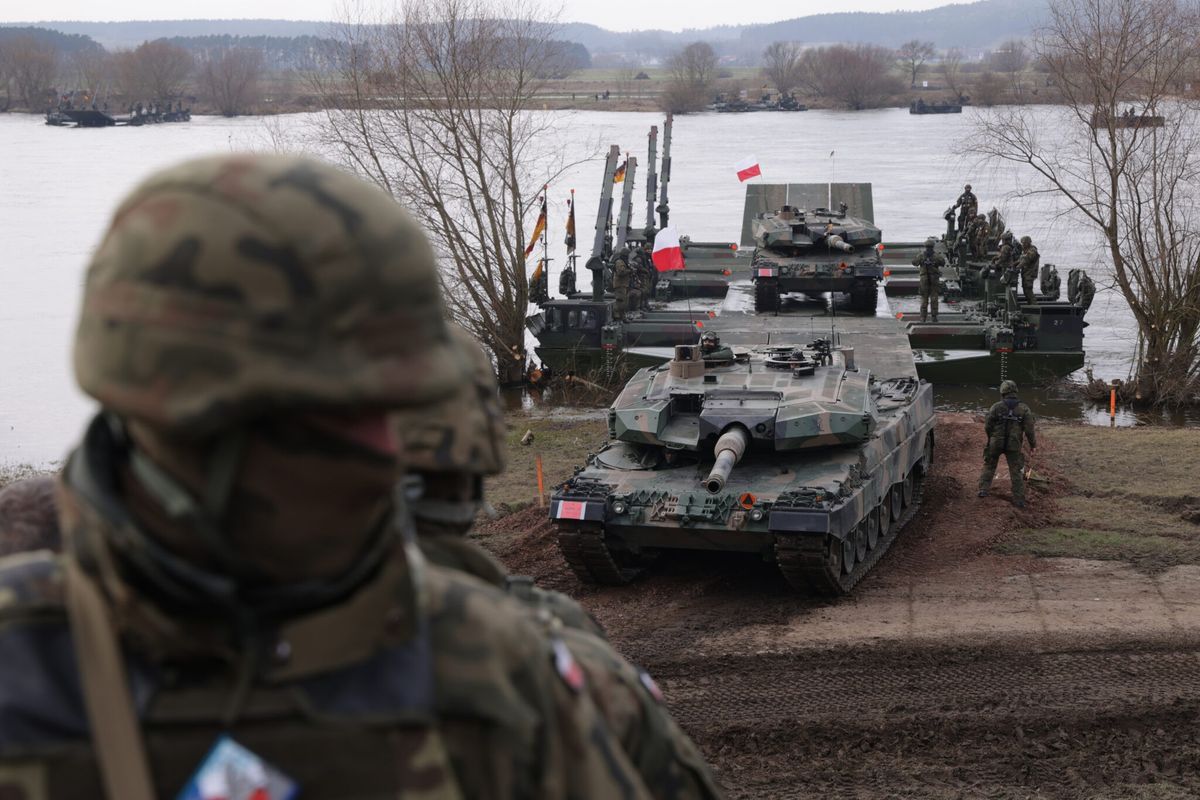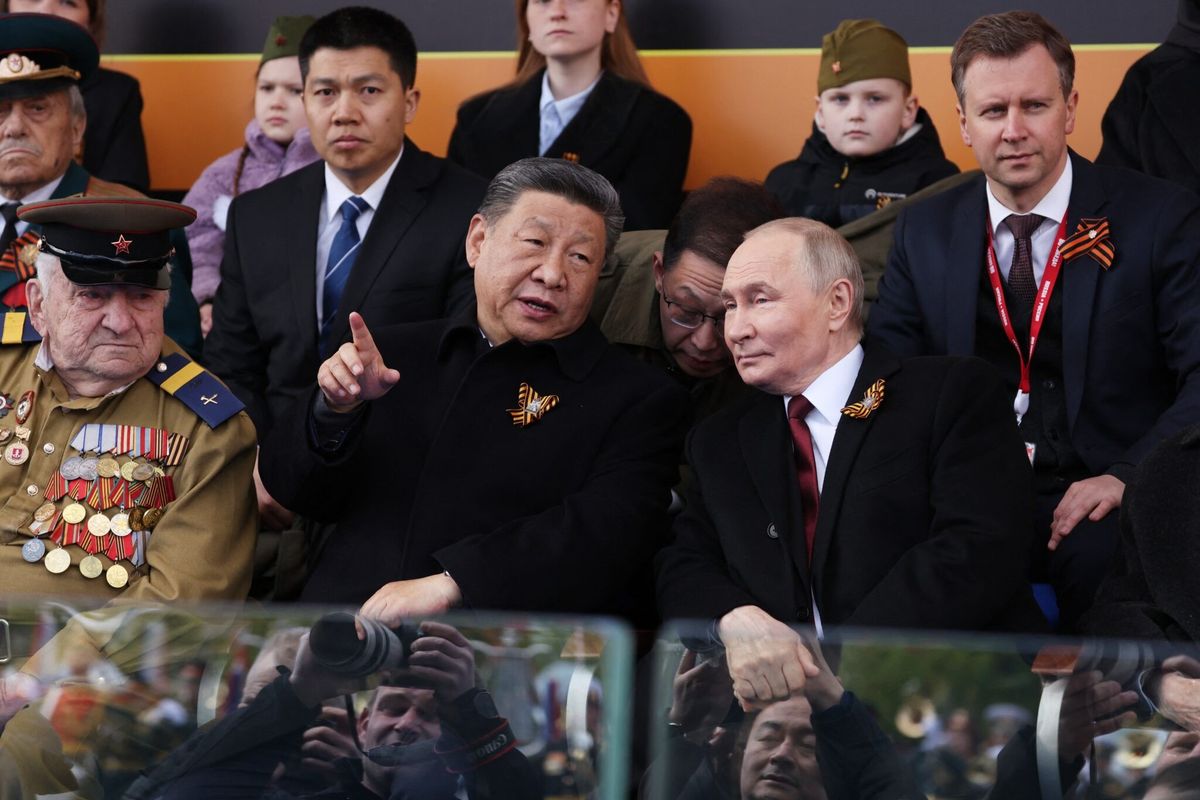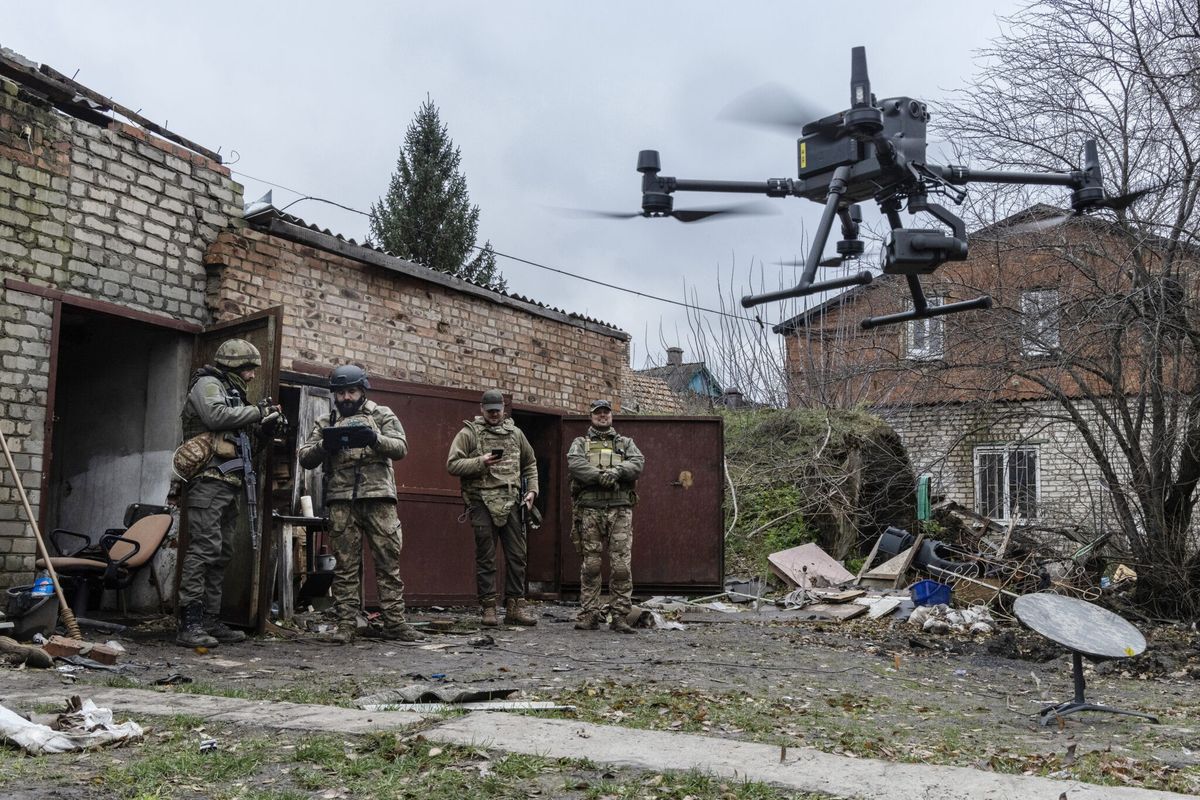SUBSCRIBER+ EXCLUSIVE REPORTING — Russia’s reaction to the new infusion of U.S. aid for Ukraine has ranged from shrugs to fury, from warnings of nuclear conflagration to arguments that the $61 billion will make no difference. Some top Russian propagandists have responded with conspiracy theories and disinformation. Overall, the Kremlin propaganda apparatus has kicked into high gear - but with a confusing mix of messages.
For months, Russia assumed that this part of its war in Ukraine was won: the flow of billions of dollars in American military aid was ending, and Russian forces would take advantage of shrinking Ukrainian air defenses and a rapidly growing edge in ammunition supplies.
Suddenly, Ukraine has a lifeline.
The Kremlin typically crafts a unified response to major developments in the war – messaging that reaches from the president’s office to leading politicians and surrogates on major Russian media platforms. This time the reaction has included a bit of everything; headlines ranging from “Ukraine bribed the U.S. Congress” to “Nothing will change” to “America is preparing to send fighters” to Ukraine. One senior official said the bill proves that “the U.S. is a sponsor of terrorism”; another said the aid would bring the world to the “brink of a direct military clash between nuclear powers.”
Perhaps the only unifying theme was ridicule aimed at Ukraine for celebrating the news. Russian President Vladimir Putin’s favorite newspaper Komsomolskaya Pravda wrote on Tuesday: “The Ukrainian social networks are going into a frantic hopak (a Ukrainian national dance) after Uncle Sam gave money for the war against the Muscovites,” the paper said. It added its view that “the joy of Kyiv is somehow premature. An entire generation (of Ukrainians) is being mowed down, and they are dancing about the billions.”
The warnings
Some of the Kremlin’s responses to the aid bill echoed Russian warnings from the early days of the 2022 invasion, when Moscow suggested any Western involvement might provoke a nuclear war.
In a video message to this week’s Moscow Nonproliferation Conference, Russian Foreign Minister Sergey Lavrov said that "Westerners are dangerously balancing on the brink of a direct military clash between nuclear powers, which is fraught with catastrophic consequences."
Russia's Ambassador to the U.S. Anatoly Antonov told Newsweek the $61 billion meant that the U.S. had "launched an all-out hybrid war against us,” and like Lavrov, Antonov accused Washington of “escalating” the “nuclear threat.”
Other officials said the U.S. aid amounted to support for terrorism.
“Military assistance to the Kyiv regime is direct sponsorship of terrorist activities,” Russian Foreign Ministry spokeswoman Maria Zakharova wrote on her Telegram channel. She said the aid would lead to “a direct path to escalation of unprecedented aggravation in the region.”
But even within the Kremlin, there were decidedly different messages. Kremlin Spokesman Dmitry Peskov shrugged off the news, insisting that "Russian armed forces are improving their positions at the front…(and) the money allocated and the weapons that will be supplied will not change this dynamic." The primary impact of the vote, Peskov said, would be to enrich the American defense industry and boost the death toll in Ukraine.
"This will lead to new victims on the Ukrainian side. More Ukrainians will die, Ukraine will suffer greater losses," Peskov said.
Another no-worries-here message came from the pro-Kremlin publication Lenta.Ru, which quoted military expert Anatoly Matviychuk saying that “American supplies are so scanty that they will not have any critical impact on the course and outcome of hostilities.”
Stretching the facts - or inventing new ones
As with nearly every major development in the war, the news from Capitol Hill sparked a flurry of Russian misinformation.
The ultra-patriotic TV channel Tsargrad (audience of more than 10 million per month) “reported” that the aid bill passed only because the Ukrainian Army had bribed the Congress.
“An insider in the office of the President of Ukraine told how Kyiv persuaded Congress to allocate money to him.” Tsargrad said. “Everything turned out to be simple - it was enough to ‘buy’ votes.”
The well-known war correspondent Alexander Kots wrote that Donald Trump was to blame for the House Republicans’ change of course. Kots warned that the aid was thus “a response to those who put their faith in ‘our’ Donald Trump. Nothing will change under him.” He added that “we will continue to move forward not thanks to, but in spite of him.”
On the wildly popular show Evening With Vladimir Solovyov (viewership: between 10-20 million), top Kremlin propagandist and RT editor in chief Margarita Simonyan said that after the $61 billion package, the next step for the U.S. would be to send troops to Ukraine.
“There aren’t enough people there (in Ukraine),” she said. “Within a week the rhetoric (in the U.S.) will move to ‘we should help them by providing those people.”
Other Russian media said the aid had nothing to do with supporting Ukraine, and everything to do with reelecting President Joe Biden in November.
“Timing is important here: war matters before the elections, after them, only peace matters,” the publication Vzglyad wrote. After November, Vzyglyad said, the U.S. would make “a soft exit” from the Ukrainian conflict.
And Zakharova, the Foreign Ministry spokeswoman, said that the White House wasn’t interested in a victory for Ukraine, “but in the fact that the Armed Forces of Ukraine will hold out at least until the November vote, without spoiling the image of Biden.”
Then there was the former Russian President Dmitry Medvedev, a leader once viewed as a Western-leaning moderate who now spews regular invective about destroying the U.S. Writing on his Telegram channel, Medvedev said news of the House vote had left him wishing that “the United States (would) plunge into a new civil war as quickly as possible…which, I hope, will be radically different from the war between North and South in the 19th century and will be waged using aircraft, tanks, artillery, all types of missiles and other weapons. And which will finally lead to the inglorious collapse of the vile evil empire of the 21st century - the United States of America.”
Russia’s next moves
Throughout the week, few of the media and political commentators in Russia have said much about the actual impact the new American supplies might have on the war.
As The Cipher Brief has reported, the Pentagon is already moving stocks of ammunition and material for air defense systems that may reach Ukraine within a few weeks. On Wednesday, the White House also confirmed that it had delivered long-range ATACMS missiles to Ukraine last month, as part of an earlier aid package. The ATACMS missiles, capable of striking targets 190 miles away, have already been used against Russian forces, including in an April 17 attack on a Russian airfield in Crimea and a separate strike on Russian troops in southeast Ukraine.
Andrei Medvedev, a member of the Russian parliament (and no relation to the former president), was one of the few political figures who mocked Russian political scientists for “joyfully and confidently” concluding that the West was done supporting Ukraine – and he was also among the few to acknowledge that the Ukrainians would gain at least a short-term advantage from the new aid. He predicted that Ukrainian forces would soon strike “more actively” against Russia’s Belgorod and Kursk regions, and that the new long-range missiles would allow Ukraine to hit the Kerch Strait bridge in Crimea. “It is precisely such actions that will allow Kyiv to report to its beneficiaries.”
Analysts have suggested that Russia will use this period - while it still holds those advantages in munitions - to strike hard. A battle is underway for the small city of Chasiv Yar, in the Donetsk region of eastern Ukraine, where ammunition shortfalls have hurt the Ukrainian resistance badly. Analysts also believe Russia may up the tempo of aerial attacks while Ukrainian air defenses remain weak; that weakness has been a major problem lately for the Ukrainian defense of its second largest city, Kharkiv, and critical infrastructure in several parts of the country. Ukrainian President Volodymyr Zelensky told PBS that Russia had destroyed the Trypilska thermal power plant, the Kyiv region’s largest electrical generator, on April 11 because “we ran out of missiles to defend” the facility.
In the aftermath of the vote to send the aid, Zelensky warned that Russia might attempt an immediate offensive or fresh air raids, and the Institute for the Study of War (ISW) echoed that concern. “The frontline situation will…likely continue to deteriorate in that time, particularly if Russian forces increase their attacks to take advantage of the limited window before the arrival of new U.S. aid,” the ISW said.
For the moment, however, Russians getting their news and information from state-backed media (in other words, virtually all Russians) aren’t getting this sort of analysis. For the most part, this week they’re getting a steady diet of vitriol, threats and misinformation.
Read more expert-driven national security insights, perspective and analysis in The Cipher Brief.














